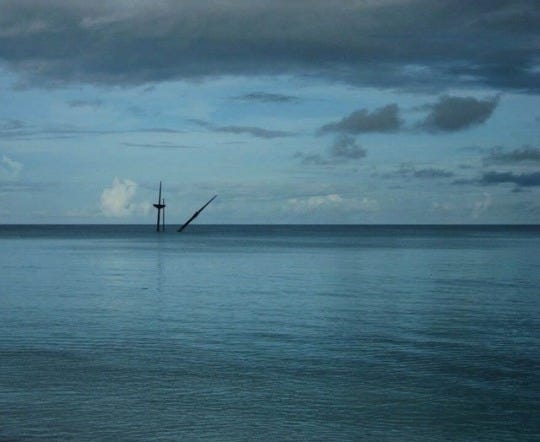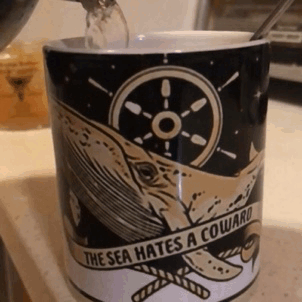Tabs Open #3: The Sea Hates a Coward

Welcome to Tabs Open!
This week: bluegrass music, bodies breaking down, ancient ocean navigation techniques, and more. Thanks for coming along for the ride.
1. The Marshall Islands, where I lived and taught for a year after college, are near and dear to my heart. Usually when they make the news, it’s because they’re being featured among the people most dramatically falling victim to climate change and rising seas, or because the United States’ nuclear testing is still devastating the islands 65 years later, or both. So I was excited to see a video recently of what I hope will be a positive development out there: a nascent program looking to build solar-and-coconut-oil-fueled sailing canoes for inter-island travel.
The project, headed up by the Okeanos Foundation, looks to build on the sailing culture and tradition of the Marshallese, who are some of the most impressive ocean navigators in world history. (For more on that, check out “The Secrets of the Wave Pilots” from the NYT. The island I called home, Aur, features prominently--there’s even a picture of the researchers eating at the same table I used to sit at during festival days after church. It’s fascinating, bordering on the unbelievable, but I have no reason to believe its contentions are untrue. Korent Joel, one of the last two ri-meto featured in the 2016 story, has since died, but Alson Kelen is still sailing and preserving tradition over at Waan Aelon in Majel--Canoes of the Marshall Islands.)
I’m a little dubious about the good done by social enterprises like Okeanos, given that they’re still beholden to shareholders and don’t exist in a system of pure altruism. But the Marshall Islands are short on time and short on project capital, and so for the time being, maybe a social enterprise will do.
2. Eugene O’Neill’s play Mourning Becomes Electra (which I haven’t read), a retelling of Aeschylus’ Oresteia (excerpts of which I have read, thanks to a college Classics course taught by a Canadian professor who I can only describe as a “mole person”) is the source of another earworm phrase I’ve loved for years now: “The sea hates a coward.” I don’t know if the Marshallese would agree with that but I do know they’ve rarely been in a position to have to worry about that.
(This is my mug.)

3. I’m a geek for Tyler Childers’ music. It’s modern bluegrass with a sound that might as well be 60 years old; in the past year, there isn’t an artist I’ve listened to more. As my 2018 memories go, getting to see him play live in Seattle ranks somewhere below my wedding and my honeymoon and somewhere above most everything else. Recently he was featured in Rolling Stone, playing “Lady May” (the song my brother and his wife danced to at their wedding) and talking about the influence John Prine’s music has had on him. Little gets me going like hearing that someone whose art I love loves the art of someone else whose art I love. I love that, ya know? John Prine has had me hooked since freshman year of college, when I heard him and Bonnie Raitt’s duet on “Angel From Montgomery” for the first time. There’s no going back from a first listen like that.
4. I am not a runner, although I come from them: my dad is still grinding out marathons at almost 61, and my mom was a talented sprinter and hurdler in her day—her relay team made the Guinness World Book of Records in 1990. I have tried at a dozen different points throughout my life to get into it to no avail. I was just never able to find the joy in it, the pure escape, that some people do--it never got past the “chore” stage for me, even as I forced myself through a few half-marathons in college.
Not so for Christopher Solomon, a fellow Seattle resident. He’s not the kind of runner they usually write stories about: he’s no world-class marathoner or Death Valley Ultra champ; he doesn’t sprint like Usain Bolt. He just runs, because he likes running. I find this a refreshing perspective--how many athletic pursuits are undertaken strictly for the pleasure of doing and having done them, without any eye toward glory or victory of some kind? He took up running for all sorts of reasons, detailed in this first-person essay for Outside Online, but here’s the one I like best:
“Running was not the answer, I knew even then. But it was the only thing that was shaped like an answer.”
None of us likes to think about our body breaking down, about not being able to do the things we once did. I’m 28 and already notice this in small ways with each passing day, with each ultimate frisbee double-header or pickup dodgeball night or (sorry mom) hangover. But Solomon has had to confront this very fact in dramatic fashion, and his contemplation of what it’s like to have something you love and need taken away from you very suddenly and unfairly is an important one. His conclusion, one which brings him no comfort even in the knowing: “We were built to break down.”
5. Last weekend I had the privilege of attending the Democratic Socialists of America’s Northwest Unity Conference down in Portland. I co-led one of the breakout sessions on political education and got to talk at length about the Socialist Night School project that we’re working on here in Seattle--an education program explicitly aimed at giving people a space for learning so that they might get out in the world and actually do something with it. Knowing isn’t enough, is the idea.
One of the first readings we taught when we kicked our night school off last fall was Peter Camejo’s “Liberalism, Ultraleftism, or Mass Action,” a 1970 essay on the three types of paths that well-meaning progressive people choose. It’s an eye-opener; reading it for the first time last year made me feel like someone had been closely observing my own political trajectory and making notes. I’m not well-versed in the historical moment in which Camejo was writing, at the peak of the movement against the Vietnam War, but I think the lessons he draws are still relevant. (This is not to say it’s a flawless, infallible text. There are a few parts that I don’t think have aged well; you’ll probably find them.)
Ultimately what I think everyone can learn from Camejo, and what gives me both the hope and the strength to keep organizing politically, is the idea that the working class has the power to change the world. (That almost certainly includes you, if you’re reading this newsletter, even if you don’t think of yourself that way.) It’s striking postal workers and air traffic controllers that can bring the federal government to heel in a way that a million calls to congressional offices can’t. It’s striking teachers that can force a city to stop making schools into branch campuses for prisons. You meet people where they are--with bodies that get sick that need healthcare, with paychecks that never seem to grow, with children whose needs aren’t being met--and you organize them around that principle. It’s a simple blueprint for changing the world; it might be the only thing that really can.
6. The other link summaries really rambled on so instead of giving you my own takes on this 2015 Jacobin piece, I’m going to just plead with you to read it so you can see what’s ailing another place near and dear to my heart, New Orleans.
7. Do you like newsletters? I’m guessing you do, if you’re reading this. Let me put in a quick plug for one that’s important to me and might also be important to you: “All In,” the national DSA Medicare for All newsletter.
Thanks for following along this week! If you’re enjoying Tabs Open, feel free to tell your friends where to find the newsletter.
-Chuck



